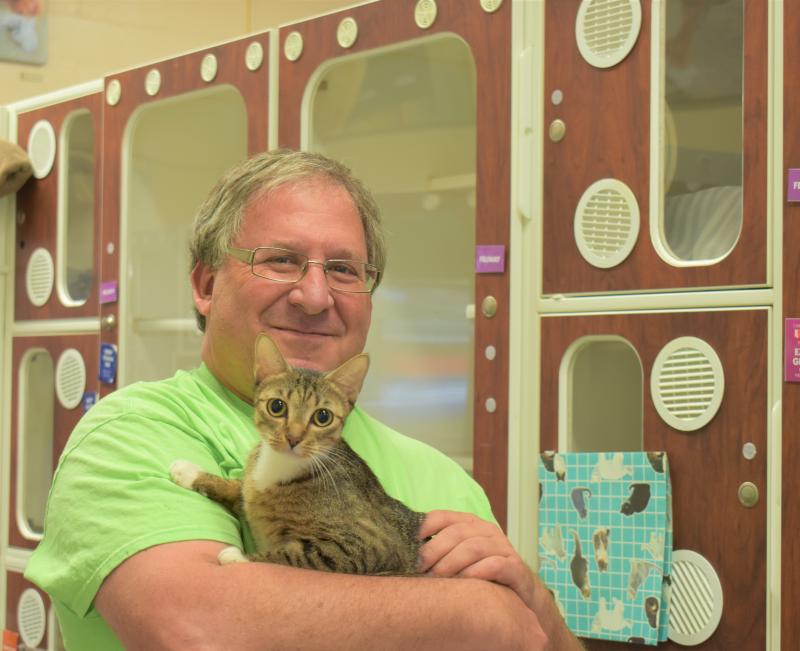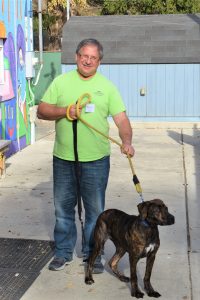
When Elliott Hurwitz, 58, lost his mother, Mildred Hurwitz, he did what many people do: He turned to an animal for comfort, visiting the Baltimore Humane Society (BHS) in the hopes of finding a companion. He didn’t know then that he would discover so much more.
“I used to have dogs growing up, and I kind of thought having a dog would help getting over the pain of the loss of my mom,” he said. Born in New Jersey, his family moved to Baltimore when he was just a few months old, where he was raised.
Around that time, he received a letter in the mail from BHS encouraging people to volunteer.
Hurwitz was reminded of how his mother had devoted herself to her community through her own activities. She had been involved with the community for as long as he could remember, volunteering regularly at the school library as he was growing up, and later, with The Associated: Jewish Federation of Baltimore.
And so, Hurwitz offered to help. He has been volunteering at BHS in Reisterstown for nearly 10 years now.
BHS, a no-kill private shelter, was founded in 1927 by Elsie Seeger Barton, who devoted her life to the care and humane treatment of animals after a battle with rheumatic fever confined her to her bed, where her pets were her constant companions according to BHS’s
website, bmorehumane.org.
“We work really hard to try and find the right home for the animals,” said Hurwitz.
Today, BHS cares for thousands of animals every year, including cats, dogs, rabbits and other small animals. The work wouldn’t be possible without volunteers like Hurwitz, say those affiliated with the shelter.
During a typical day there, Hurwitz might help clean the cattery, which is the system of condos and cages where the cats are stationed. He might also help clean the dog kennels and do laundry or dishes for the shelter, depending on what is needed.
“Volunteers are important because they can help the staff get the necessary cleaning finished quicker so they have more time to spend taking care of and interacting with the animals,” explained Hurwitz.
They also socialize the animals so that the shy and nervous ones are more prepared to be adopted, he continued. Volunteers can also pick up animals from other shelters, take the dogs on field trips and the animals for vet visits, allowing full-time workers to stay at the shelter, which is often short-staffed. In that sense, volunteers can help fill some staff roles.
‘It helps to give back a bit’
Such activities, he said, can be both fun and rewarding.
“We just recently had a Dog Fest fundraiser,” said Hurwitz, with vendors, food and drinks, and activities for the dogs “to run around and do different things, like contests.”

Getting involved with the shelter isn’t only for adults. The shelter’s Bmore Humane Kids Club for kids ages 5 to 13 teaches kids about humane practices for taking care of animals with games and activities. The kids club also offers opportunities to read to
the animals.
Each year, Hurwitz averages 170 hours volunteering at the shelter, four to five times a month for nearly five hours at a time.
“If people and animals are in need, it helps to give back a bit,” he said, noting that his work at the shelter exemplifies the Jewish value of tikkun olam, of helping to repair the community and society. Hurwitz is a member of Congregation Beth Israel in Owings Mills, where he became a bar mitzvah.
Animals have always had a special place in Hurwitz’s heart. When his brother returned home after graduating college, he brought a dog with him. Named Killian, the dog was a Great Dane and Chesapeake Bay Retriever mix. Killian captured the hearts of his family instantly, recalled Hurwitz, lounging, cuddling and just “hanging out. In the 12 years of Killian’s life, he made a strong and lasting impact, added Hurwitz.
A recent poll published in Frontiers in Veterinary Science, a scientific research journal, revealed that 90% of pet owners consider their companion animal to be a family member.
Adopting a pet at the shelter is a relatively simple but thorough process. Applicants are required to be at least 18 years old, pass a background check, have their current animals up to date on vaccinations, and the adoption process must be completed by the primary caretaker of the pet.
For more information, call 410-833-8848 or visit: bmorehumane.org.







